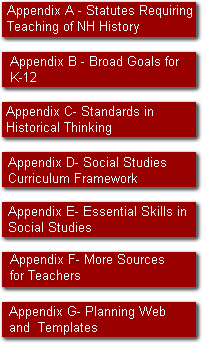 |
 |
|
|
 |
APPENDIX D: K-12 SOCIAL
STUDIES CURRICULUM FRAMEWORK
NEW HAMPSHIRE -1995 This is a summary list. The full curriculum framework, including proficiency standards, is available from the NH State Department of Education. Civics & Government
Curriculum Standard 2. Students will demonstrate an understanding of the fundamental ideals and principles of American democracy; the major provisions of the United States and New Hampshire Constitutions; and the organization and operation of government at all levels including the legislative, executive, and judicial branches. Curriculum Standard 3. Students will demonstrate an understanding of the relationship of the United States to other nations and the role of the United States in world affairs. Curriculum Standard 4. Students will demonstrate an understanding of the meaning, rights, and responsibilities of citizenship as well as the ability to apply their knowledge of the ideals, principles, organization, and operation of American government through the political process and citizen involvement. Economics
Curriculum Standard 6. Students will demonstrate the ability to examine the interaction of individuals, households, communities, businesses, and governments in market economies including competition; specialization; productivity; traditional forms of enterprise; and the role of money and financial institutions. Curriculum Standard 7. Students will demonstrate an understanding of different types of economic systems, their advantages and disadvantages, and how the economic systems used in particular countries may change over time. Curriculum Standard 8. Students will demonstrate an understanding of the patterns and results of international trade including distribution of economic resources; imports and exports; specialization; interdependence; exchange of money; and trade policies. Curriculum Standard 9. Students will demonstrate the ability and willingness to apply economic concepts in the examination and resolution of problems and issues in educational, occupational, civic, and everyday settings. Geography
Curriculum Standard 11. Students will demonstrate an understanding of the physical and human geographic features that define places and regions. Curriculum Standard 12. Students will demonstrate an understanding of landform patterns and water systems on Earth's surface; the physical processes that shape these patterns; and the characteristics and distribution of ecosystems. Curriculum Standard 13. Students will demonstrate an understanding of the impact of human systems on Earth's surface including the characteristics, distribution, and migration of human populations; the nature and complexity of pattens of cultural diffusion; patterns and networks of economic interdependence; processes, patterns, and functions of human settlement; and the forces of cooperation and conflict that shape human geographic divisions. Curriculum Standard 14.
Students will demonstrate an understanding of the connections between Earth's
physical and human systems; the consequences of the interaction between
human
Curriculum Standard 15. Students will demonstrate the ability to apply their knowledge of geographic concepts, skills, and technology to interpret the past and the present and to plan for the future. History
Curriculum Standard 17. Students will demonstrate a knowledge of the chronology and significance of the unfolding story of America including the history of their community, New Hampshire, and the United States. Curriculum Standard 18. Students will demonstrate a knowledge of the chronology and significant developments of world history including the study of ancient, medieval, and modern Europe (Western civilization) with particular emphasis on those developments that have shaped the experience of the entire globe over the last 500 years and those ideas, institutions, and cultural legacies that have directly influenced American thought, culture, and politics. |